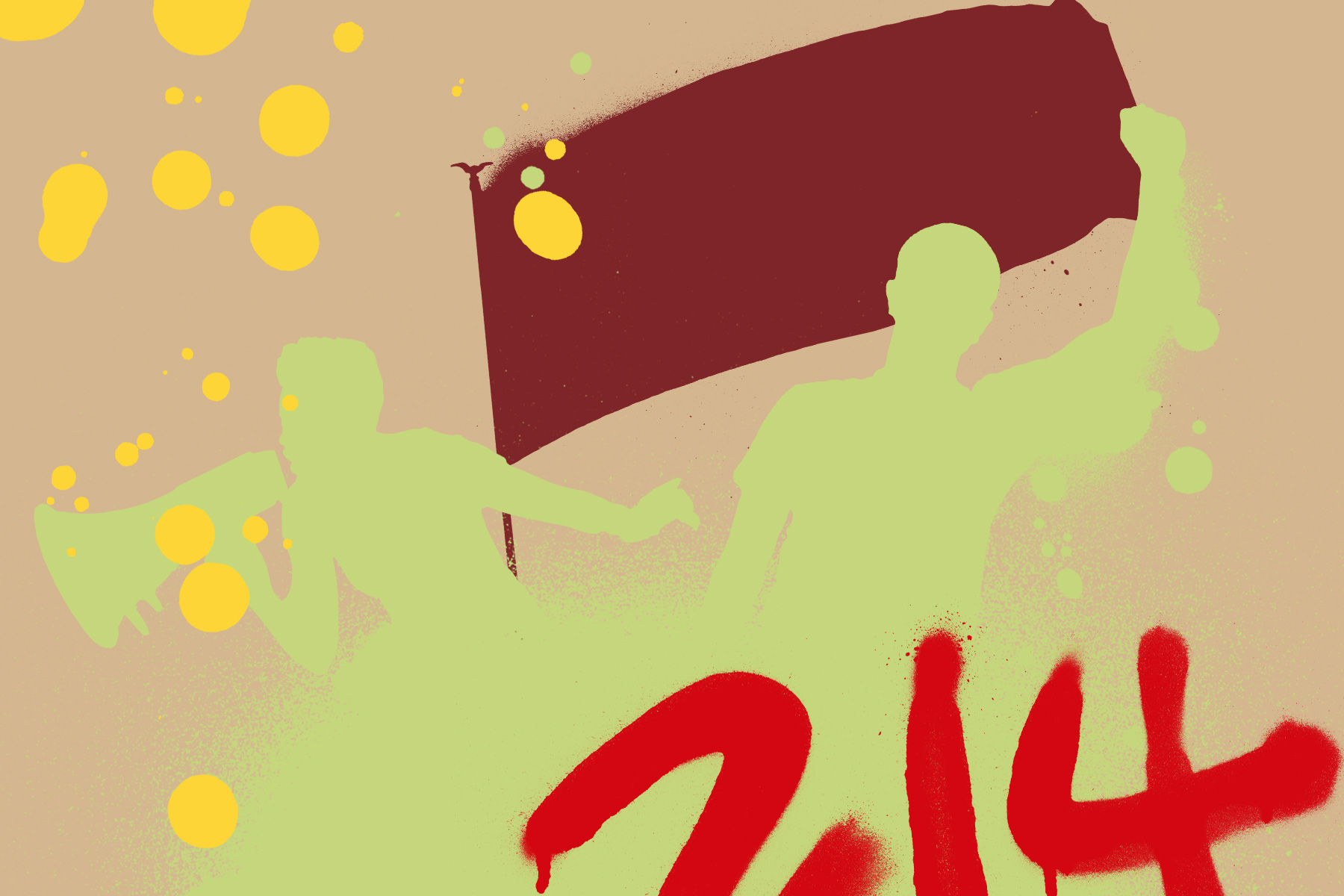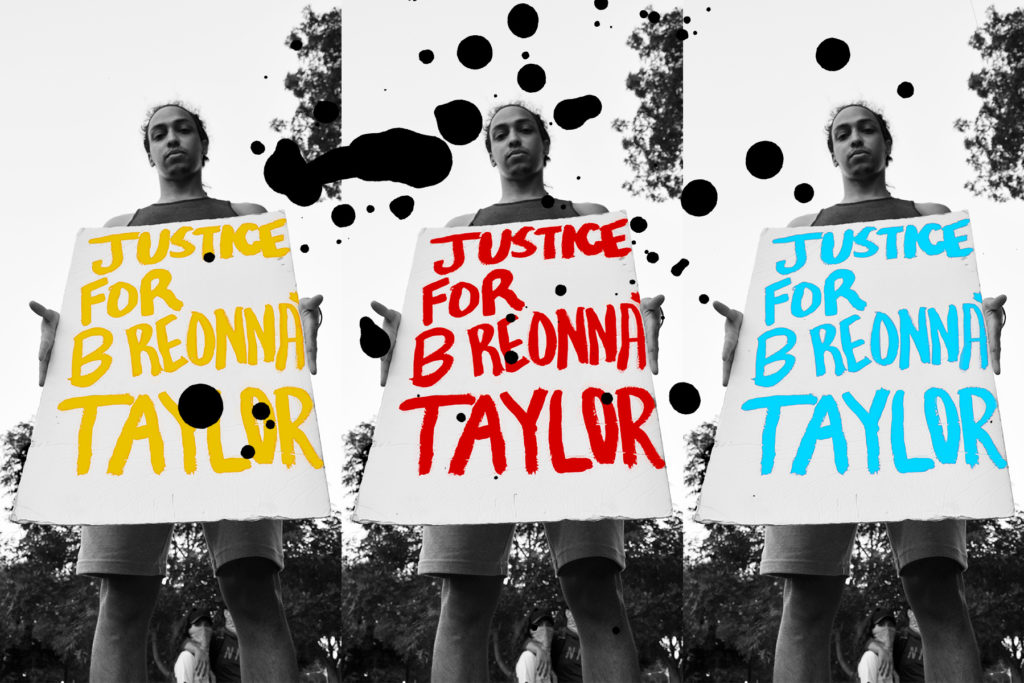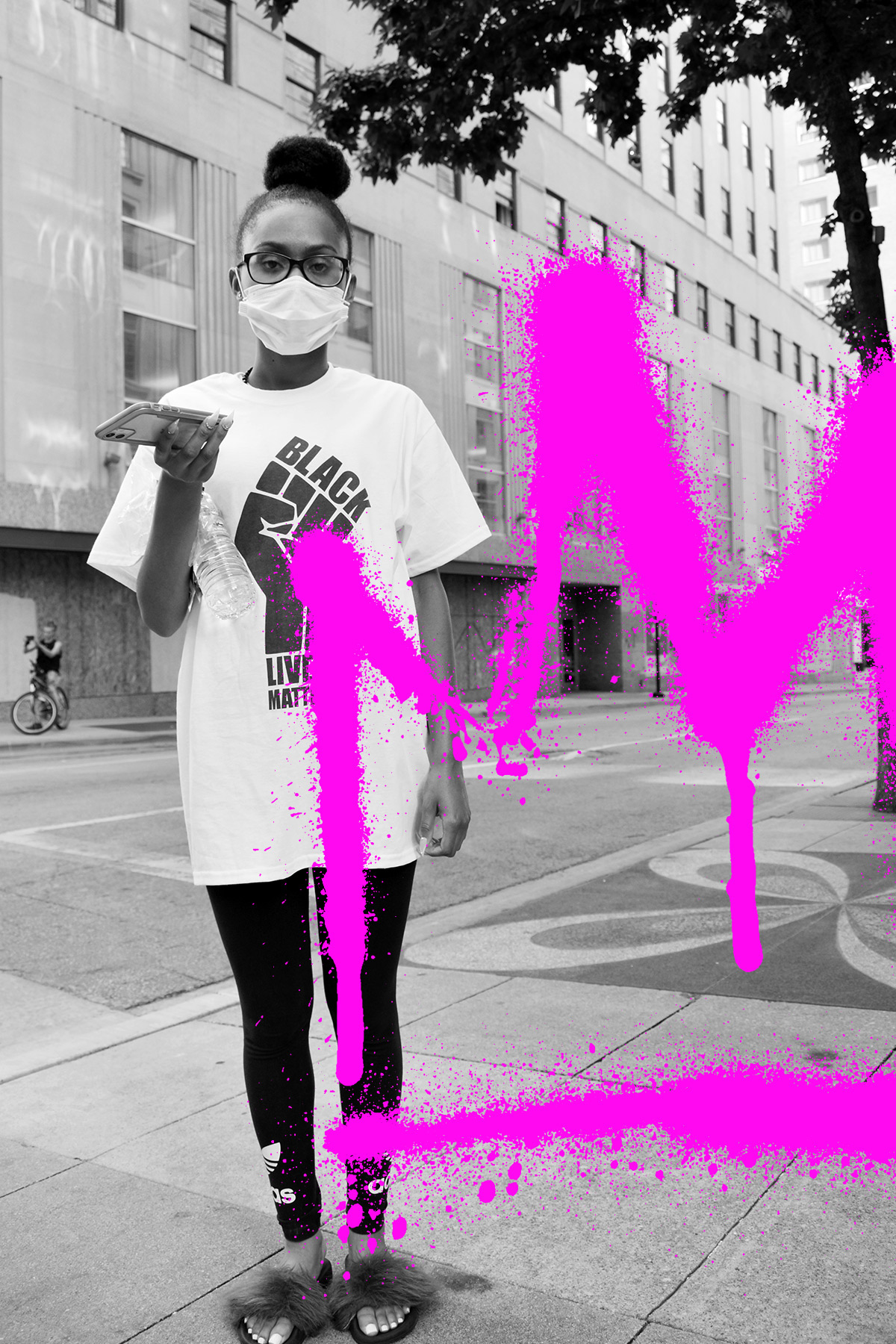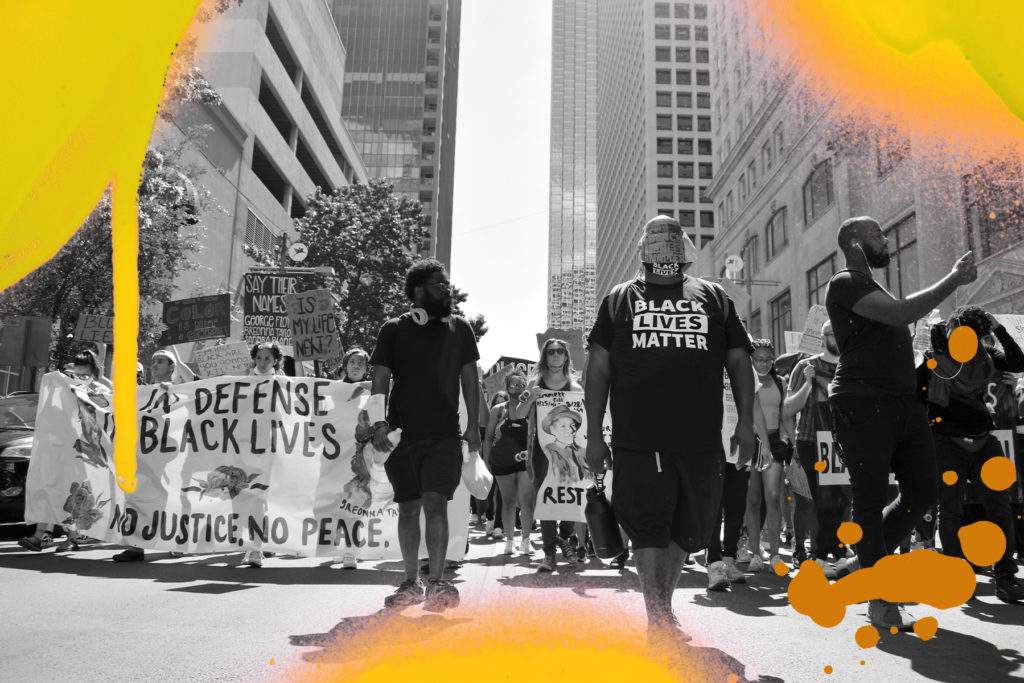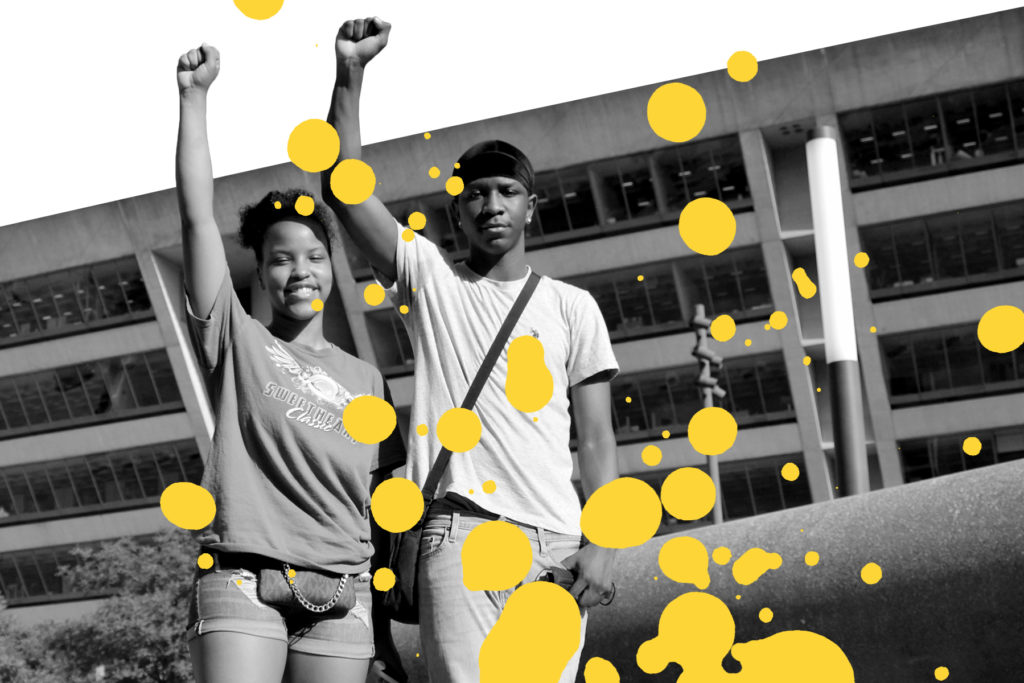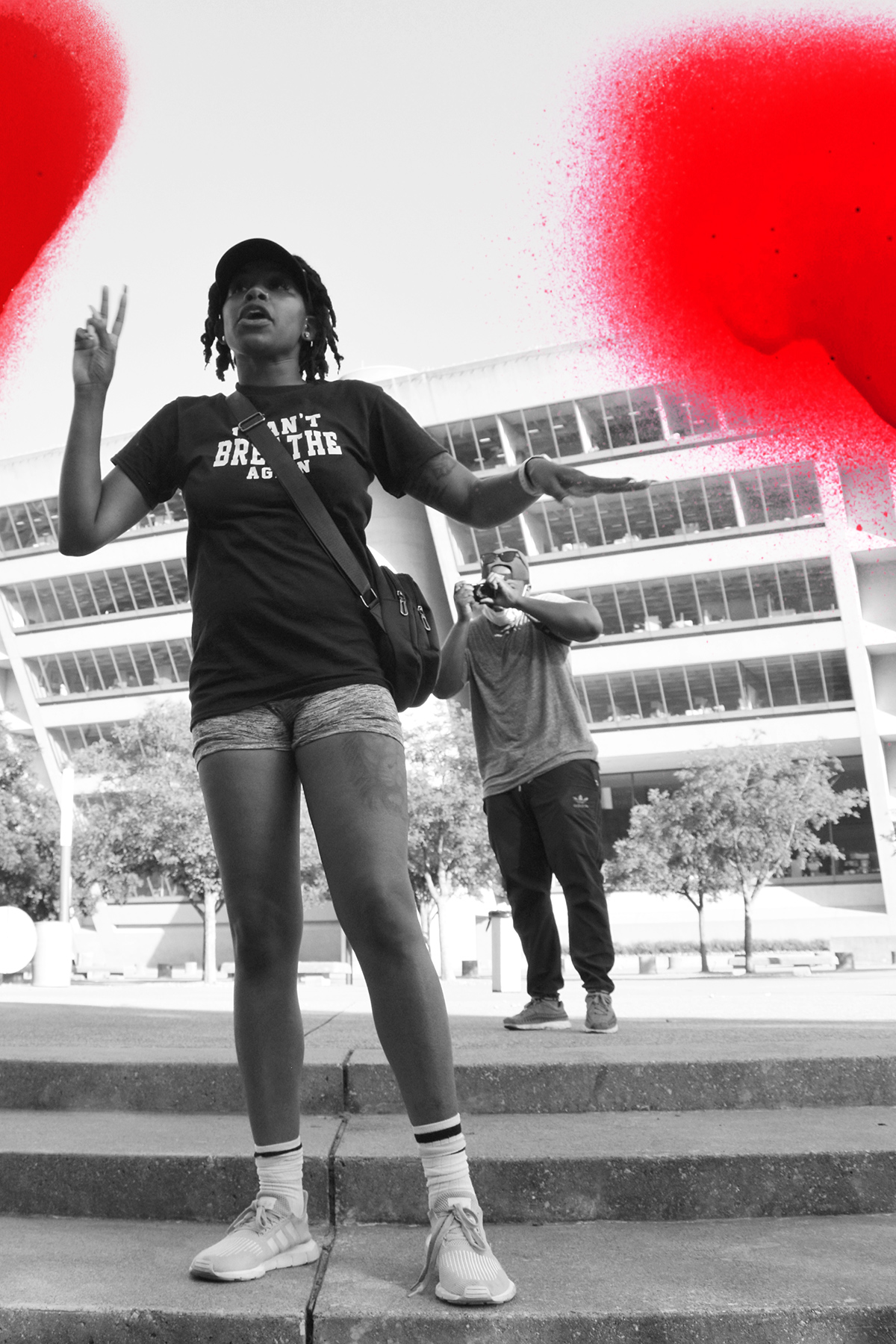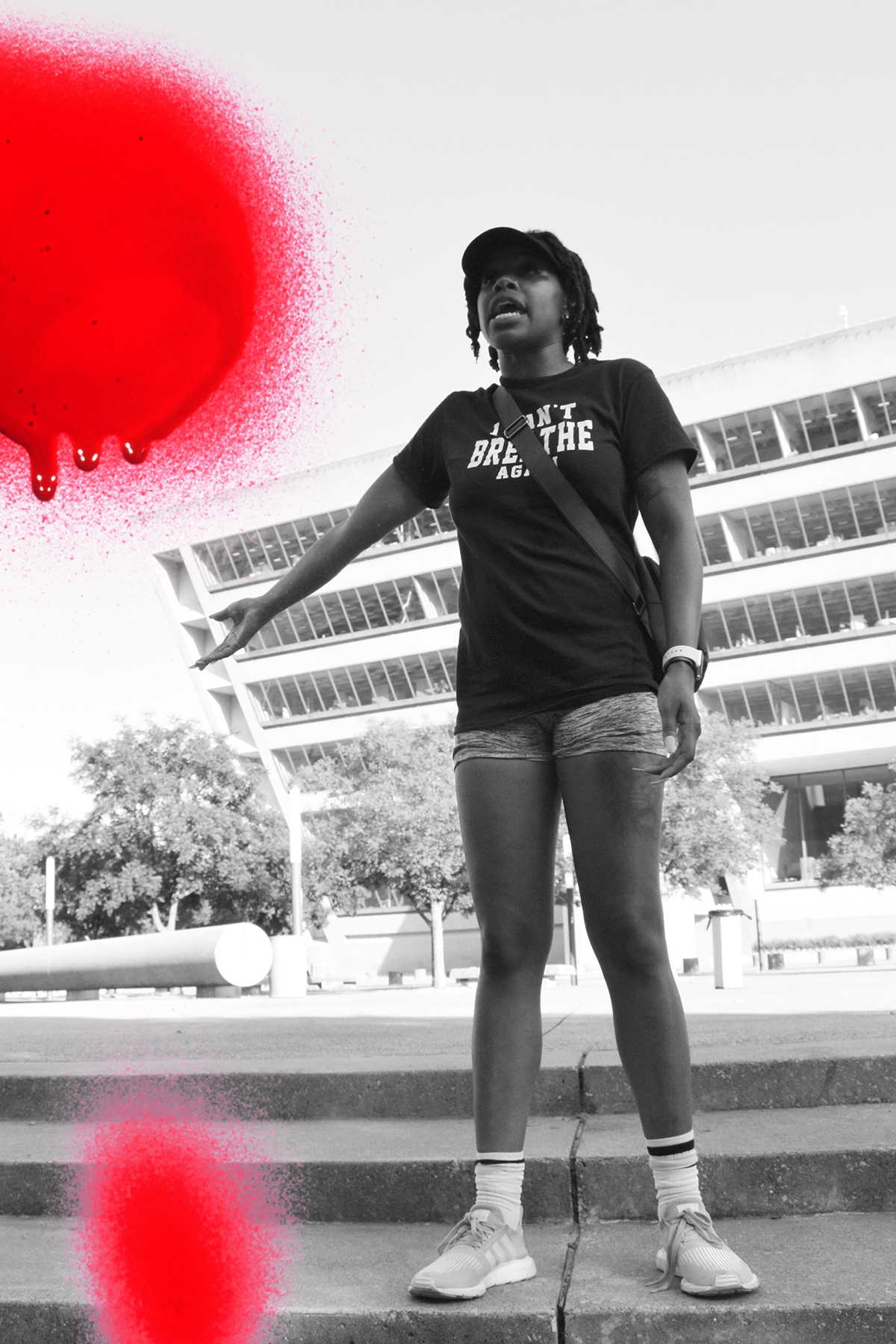Since late May, protesters have marched through nearly every part of Dallas. They’ve peacefully expressed solidarity against police violence in downtown, Uptown, Deep Ellum, the Cedars, Lowest Greenville, Oak Cliff, and South Dallas. The demonstrations have even reached the Park Cities, Southlake, Frisco, and Plano.
Some protesters demand divestment from the Dallas Police Department and the reallocation of those public dollars to housing and social services. Others demand the Dallas Police Department be outright abolished. There are calls for departmental policy changes and new laws and regulations to increase police accountability, create equity in the criminal justice system, and end institutionalized racism. Some are first-time protesters. Others are veterans.
But what unites everyone in the streets is a desire for profound, permanent change.
These are the words of a few protesters, captured over the last week. Meet them. And listen to them. (The interviews have been edited for length and clarity.)
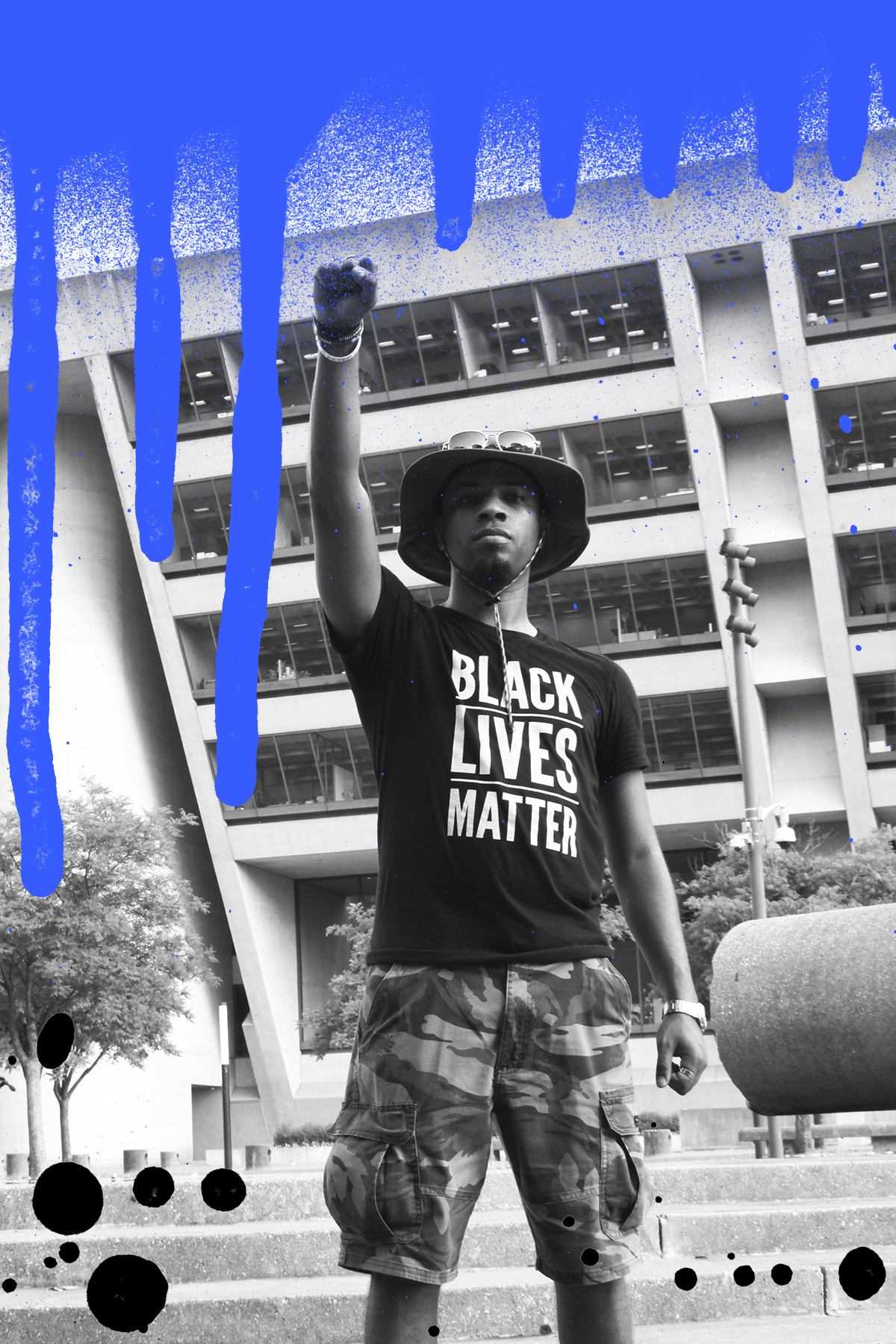
“I’m just an individual citizen that felt compelled to come out here and do my part to speak up and share my voice for the concerns that encompass the whole of the Black community and all minority communities.
Basically, what initially compelled me was the death of George Floyd. The death of George Floyd was a brutality, and it was something that was uncalled for. But it also had a collective awakening behind it, letting a lot of young people know that you are in danger as well. We all felt that knee on our neck when this happened. I just couldn’t sit back and sit in my home while everybody else in my community came out here and did their part to speak up. I had to come and do the same.
I want to see some of the sentencing laws that come with criminal activity, the over-sentencing and stuff like that—that needs to be cut back. So I would like some legislation put in place to help equal out and put more fairness in sentencing for crimes. And then I also want to see certain systems put into place within the police enforcement agencies that provide accountability. If officers see each other doing something that could result in bodily harm, they need to be able to step to each other. They should be required to say something to each other. I also want things such as using your knee as a subduing method on an individual to be banned, and things of that nature. So, there’s a whole lot of things.
And especially, just get out and vote. We have to get out and vote and get the people that are going to make these changes happen into office, so that we can have everything we’re protesting for become a reality. Without the people that back us inside public office, our voices will never be heard.
And vote for all offices. The city councilmen, your mayors, your state representatives, your Senate leaders, your House of Representative leaders, all the way up to the presidency. We have to have people that are gonna bring the nation together and implement it into office, not only at the highest levels but also at the lowest levels. On your school boards, on your city funding boards. All these different things have to be put into place so that we can get betterment in our communities.”
“I’m simply protesting the oppression of Black people. All people that may or may not want to identify as Black. Because at the end of the day, the whole system’s corrupt. It’s not just Trump, it’s not just police—it’s Biden, it’s Democrats, Republicans. We never got that third-party system; that fails every single election. So I’m out here to just bring awareness and fight for our rights, our equality. We’re not guaranteed the same rights that everybody else is. And that’s just not happening for us. It never has.
Everything is so multi-layered and systemic that it’s from small things to big things. Not everything begins with murder. It’s everything, interactions all the way up to the craziest of crimes. The biggest thing that we can focus on right now, until we start knocking these things down, is, police need to be better trained. They don’t even get six months of training at academy. I do Judo, Jujitsu, Muay Thai, and wrestled in high school. I didn’t resist when I was getting arrested on Saturday. Five cops took me down. I got injured, scraped up, bruises all over me. I mean, I was in pain. That was all because they can’t not lethally take somebody down. So it takes five, six, however many. It takes a knee in the neck to get you, because they have no ability to do anything non-lethally.
They can’t keep saying, ‘Well, we’re afraid,’ when they got the guns, they have the weapons, they have the armored vehicles. It’s just not a good excuse anymore. So, I mean, that’s the first thing: better training for police officers. Holding them accountable. And just overall, just deescalating the amount of force they use. Because me, I’m 155 pounds, 5’ 9’’. If I can take somebody down twice my size with not a whole lot of effort, why does take five grown men who are over 200 pounds to take down one person, and you still injure them?
To strike at the root, the first thing that everybody has to do is just realize what racism is and that they are racists. I mean, it is OK to say you are racist. That is OK, that is your right. You have freedom of speech, you can feel how you want. The problem is when you start taking action against people. If you can admit you’re racist, you can start moving past that. And that works at a micro-level, with the communities and the day-to-day interpersonal relations. As we have children and we grow up, they become judges, police officers, lawyers. Now all of the sudden, they’re treating people like people, because they’ve addressed their inner turmoil. So, that’s the easiest thing to do and the most efficient thing to do. But if people can’t even admit they’re racist, or that they have racist thoughts, well, you can’t get nowhere. Dialogue, being open, admitting it—that’s the first step.”
“I’m protesting for us. A couple years ago, I lost my cousin to a police officer. So when I look at this, I look at this from a different perspective. When I heard about Trayvon Martin and other black people getting killed, it was like, Damn, this is messed up. But then when it happens to you, your family, it’s completely different. So, I just feel like it is my duty to be involved. Get out there, educate my people, educate other people of other races about what’s going on—systematic oppression. Everything that we go through. I’m just playing my part.
Right now, this is a different generation. As you can see, we are completely different from our history, our ancestors. So us, right now, when I say, ‘educate my people,’ making them aware about what’s going on. I’m talking about laws, policies, getting them involved. You need to vote, putting us in a position of power, to have a hand in the justice system. That’s why I make it my sole duty to get my education and infiltrate the system. But I’m only one person. I can’t do it by myself. So if I can put my hand out there and talk to you if you have a question or there’s something that you don’t know, I’m here to talk to you. I’m here to educate you, to make this a teachable moment, understanding that, no, you don’t have to do this fight with violence. You don’t! But you have to understand: when you put anger, fear, hurt, it causes stuff like this. It causes a riot. That’s just what’s going on. That’s where we’re at now.
This is not an opportunity for you to steal. Which I’m not saying that my Black people are stealing, because it’s a lot of people of other races that are doing the looting. So now you’re taking or discrediting the movement that we’re standing for. We’re standing for: Y’all need to stop killing us. Racism is still real. Any place that I go to, literally, people don’t look at me as a college student. I’ve never committed a crime in my life but I’m treated like I’m a criminal. I come from a strong, powerful, Black family. Well-educated. And we still get treated like shit. And even if you’re educated or not, you can’t just treat my people like this. You have other people like me that see it like, ‘OK, I can try this another way.’ But then you have other people that demand justice right then and there. And that’s what it’s come to.
Right now, we’re fighting for basic human rights. You know? That’s what I feel like we should mainly focus on—treating us like we are human beings. Treating us like human beings. These stereotypes need to be diminished. Education. We need y’all to put back into our own communities. Right now, I’m educating myself. I’m getting involved. I’m seeing what I can do. I could never just sit back on the back burner. And like I told you, I’ve already experienced this firsthand. So I’ll be damned if I don’t protest, if I don’t speak up for my people. Especially if they’re scared. If I can do it, I’m gonna do it.”
“For me, when the police do march with us, it shows that they care. Even if they’re just out there for the show, they care. For them to say, ‘I’m going to get out, I’m going to walk with you. I’m going to chant as well.’ That means a lot. When we stood here and we talked about leadership to those two officers—one of them who had stripes on his shoulders, so he’s a sergeant, or I’m not sure what his rank was, but he had a couple stripes on his shoulders—to have them sit there listen, and take it where it’s not all kumbaya, it’s saying the real stuff. Where you’re saying, ‘Look: I am afraid. When the police get behind me, I am afraid.’
I want you to be in the car with a black man with the police behind him. Our blood pressure goes up. It’s a whole different story. I am legal, I don’t have any tickets. I’m legal, I don’t care. So to have two officers coming out here to say, ‘Hey, I’m gonna listen.’ We can’t say what they’re gonna do once they leave—but at that moment, they’re listening to what we have to say. That’s important. The optics, walking with us and all that, that’s fine. But to sit here and say, ‘I’m going to sit here and listen. Hopefully something that you say resonates with me and I can take it back to my daily life and my dealings with the citizens of Dallas.’
It’s also knowing that your City Council members, who you elected, that they’re listening—that they understand that the people, right now, are united. You have people who right now are engaged in the process. People are demanding change. That change is coming with the police oversight committee. That change is coming with policies that affect us. That change is coming; some of the money that used to go to communities—for community programs, basketball or whatever—is no longer there. This is about putting some of that money back in the budget.
Our youth have nothing to do. If you look at the city of Dallas—and you look, I’m going to say, 10 to 15 years ago—they had programs in different communities. You had programs in, say West Dallas. You had West Dallas Community Center, they had nine centers in the West Dallas area where youth could go to. Now they’re not there anymore. You used to have a Boys and Girls Club in that area. Boys and Girls Clubs is not there like it used to be. So where do these youth go? Our young people, where do they go, to where we can build them up? Right now, we’re not building those youth up. They have nothing to do. It’s like they play video games and they do stuff. So our youth is what we’re fighting for. We’re fighting for those little Black boys and girls in South Dallas, West Dallas, Oak Cliff, East Dallas—we’re fighting for them. Because at the end of the day, what do they have to do?
I used to really be involved, and then I got real quiet. But now I’m back. Now I think my voice is needed. All of our voices are needed. But it’s time to say, ‘Hey, enough is enough. How are you guys going to affect our community?’ I’m real good friends with Casey Thomas, who’s a City Council member. I will text him, ‘Hey, Casey, this is going on. What are you going to do about it?’ So that’s where we are now. It’s saying, ‘We’re gonna hold you accountable.’ If you’re not accountable, then it’s time you’re voted out. If we don’t see you in our community and you’re the elected official, then you need to be voted out. Plain and simple.”
Nigel: “We’re out here to protest. Freedom of speech. This is actually my first protest, by the way, so it’s pretty new to me. I came to the streets to be heard. I want people to hear that Black lives matter.”
Yazmin: “I feel like it should be equal. I don’t like that it’s different in how two races do something the exact same, but one maybe gets killed, and the other one just gets a ticket. That’s not right. Since I can’t vote, I can educate myself, more and more. Because I don’t really know much. It’s my first protest. But I can educate myself, educate others that might not know what’s going on. Just keep bringing awareness.”
Nigel: “If it has to take the protest and the rioting for us be heard, then let it be.”
Yazmin: “It can be peaceful. Last Friday was very peaceful.”
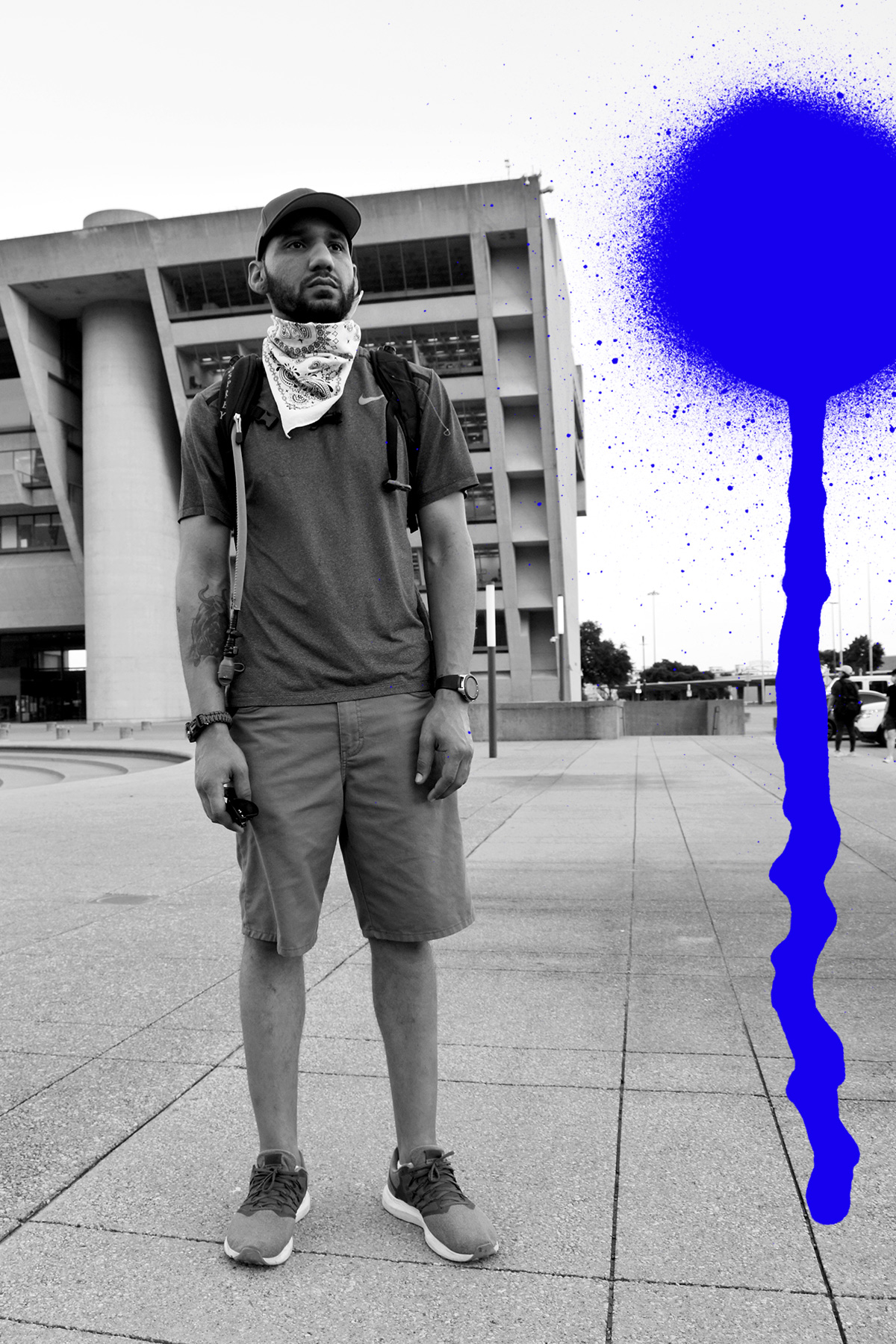
“In talking with friends and family, that was one of the biggest concerns that people had—is that people are just out here and there doesn’t seem to be any real leadership yet. One of the things I was explaining to my dad, in particular, is that, I think that first weekend that people were out here, they had that visceral reaction to what they saw. And you can’t blame people for that. I also don’t condone the violence. I try to understand the thought patterns without justification. On the backs of COVID, and being locked up, and feeling like nobody’s looking out for them, things got a little chaotic.
As they calmed down over the weekend, when you come out and see these protests, there’s a bunch of different groups that are out here. And I think the only way to figure out which way you want to move forward and who you want to support is to come out and hear those groups. The longer we’re out here and we hear more of these ideas, I think what that’ll do is hopefully bring people together to discuss differences, how they can best move forward to actually affect change.
The big thing for me is bringing people together. There are some folks here in this crowd, at every protest that I’ve been to, who are on a more extreme end of the spectrum as far as what they want. I’ve heard everything from policy change to completely defunding the police department. And I think what’s important about people coming together and hearing these ideas, is, maybe there are some of those folks who are just still so frustrated, and just a couple of degrees off center, that hearing these conversations will maybe bring them into the fold and keep them from going to more extreme behaviors and doing things that in the perception of those watching the media are hurting the movement rather than helping it.
It’s really hard to come up with new ideas and new patterns of thought if you’re not exposed to other ideas and other patterns of thought. Not just ones that agree with you—you have to get outside of your bubble. Because my thing, is, if you can’t properly explain the opposition’s point, then you don’t really know what your point is. You have to be able to understand it so you can come up with a more well-rounded perspective of how you’re going to either come together with those folks or disagree with them.”
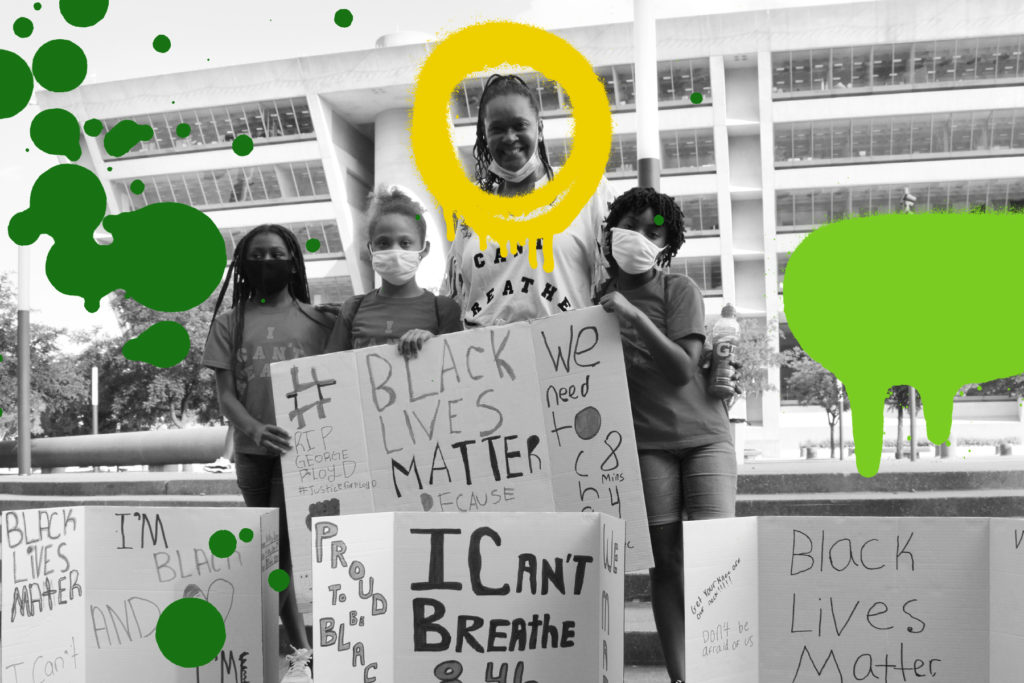
“We’re out here protesting because we are sick and tired of the injustice of our African American—we used to say African American men, but it’s now women as well, so, our African American people—and how they are literally, constantly, being killed unjustly. And then there’s no consequences for the killer’s actions. So it’s like, ‘OK, well, we’ll kill the next one because we’re gonna get away with it.’ We’re saying, ‘No, we’re sick and tired of all you all doing this to us.’ And it’s like, now, not only do the laws need to change, but you need to change the Constitution. You need to change it and let them know that we’re just as much citizens as anybody else, and until you change the Constitution, you won’t change the minds of these people.
That’s where it needs to start. Go all the way back to the beginning. And once you go all the way back to the beginning, and then you start building from there. You got to tear that mess down and then build from there. Because the Constitution justifies them. But what justifies us? And that’s why we’re out here. And I’m teaching my young people. I can’t breathe, but I’m teaching them so they can breathe. I need them to be alive. And that’s where it’s coming. And that’s why I’m out here.
Yes, we’re angry. But by the same token, we’re hopeful. And so unless change starts from within, we can’t change the minds and hearts of people. That has to change within, and they have to want to change. And all this that’s seen out here—we got Blacks, whites, all kinds of people—and once they see that, then they’ll see that we are on a unified front. And that’s how we’re going to change everything, being unified. Before it was just like, ‘Oh, OK, well, we’re saying only Black lives matter.’ That’s not the point of anybody else’s life. We’re the ones that’s being gunned down every day. Y’all can go home and go to sleep. We ain’t got no peace. Some of us out there are crying every doggone night because of the simple fact that police officers is doing this when they go and do drive-bys, they’re going by doing all this pulling them off and on. Why? Why?
A white person can cuss a police out, they can—‘Oh, you fucker this and you fucker that!’—they say all kinds of stuff. And the police never, ever take them in. They never lose their life. But a Black person says, ‘Let me get my license,’ and you get shot. No, it’s not fair! And we’re tired of it! And so that’s why we’re out here, we’re tired of it. It’s plain and simple as that. They need to change from within. Change that Constitution. Three-fifths of a human? No! No! We’re not three-fifths of a human, I’m a full human being, and proud of it. Dallas has been angry for longer than a week.
You know what? You can usually say, ‘OK, it’s elected officials.’ But you got citizens—white citizens—that’s treating us the same doggone way. So it’s not necessarily about just the system. It’s the hearts of men. The hearts of men is gonna have to change. And when the hearts of men change, then that way everybody else is gonna change. But you can’t sit back and say, ‘OK, well, it’s just them, or it’s just one particular group.’
No, it’s a whole lot of people. So yeah, we want to start with the officials. That police department—they’re gonna have to change within. When I see some injustice going on, I’m gonna say something. I couldn’t have been no bystander over there with [George Floyd] being [suffocated] for eight minutes, and just standing there saying, ‘Get off of him!’ They’d have had to arrest me. Because I would’ve went over there and pushed his tail off of him. No! You’ve got to stand up and do something. And that’s what we are out here doing now. Standing up and saying, ‘We’re tired of doing this over and over and over again.’ Somebody got to say something. Somebody got to do something.
I appreciate all the other cultures that’s out here. That’s a wonderful thing. But by the same token, they need to see it was well. And I think that they have saw that now. You see white people getting pushed around. Now they see how we feel. You know? White people are saying, ‘Oh, well that’s not fair!’ Hell, we’ve been saying that for 400 years, it ain’t fair! But now you see. Because God, they’re treating you like they treating us. And it’s not fair. And so we’re saying, ‘They need to stop.’”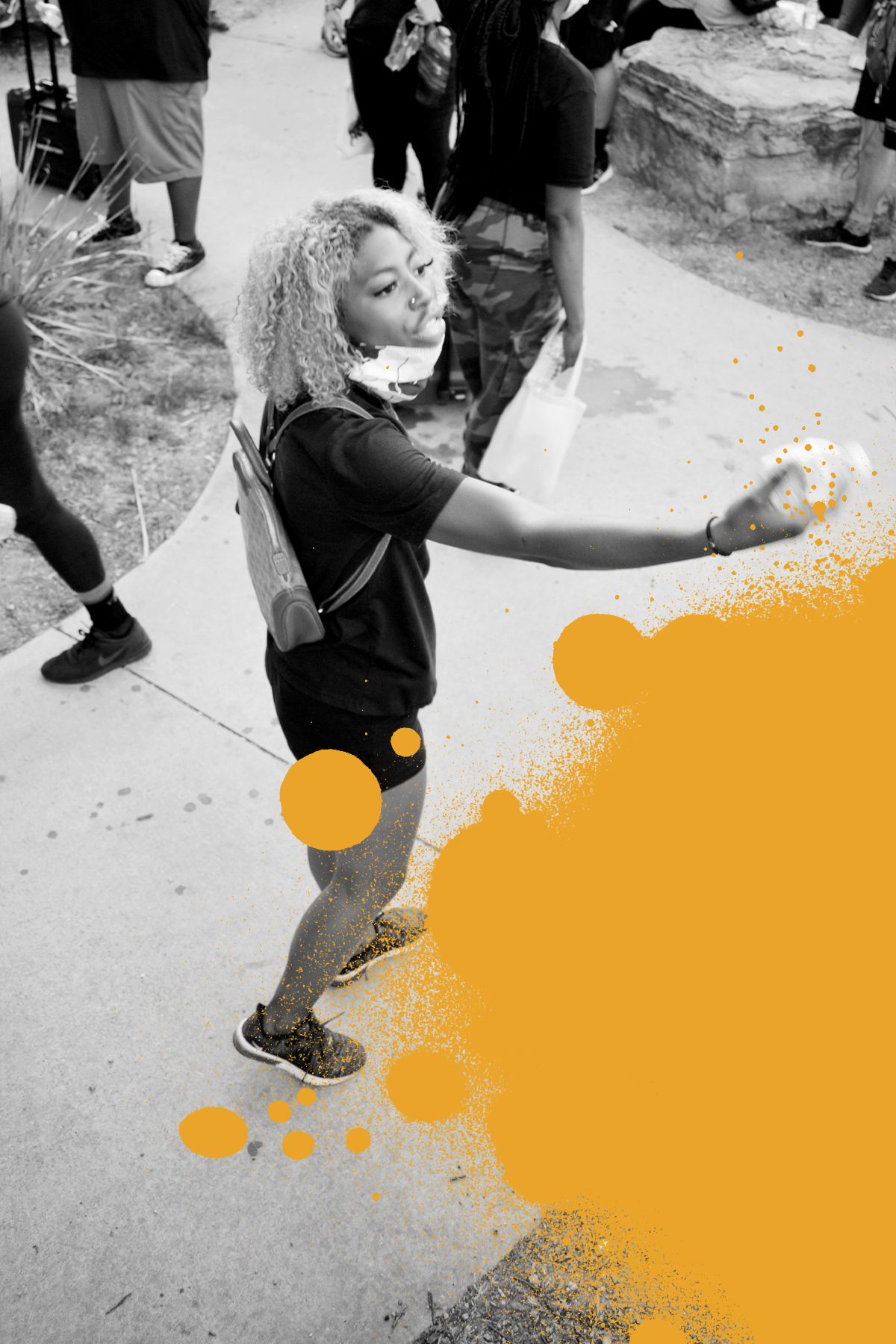
“I’m standing up because other people aren’t standing up. I’m really standing up for those who are not standing up because they’re too scared. I’m gonna show them that you don’t have to be scared to stand up. And it doesn’t have to be you for it to affect you. You can still stand up because it still affects you.
I wasn’t saying anything at these protests. I was just going around singing, in the back, with my mic. But, it was just—people were too complacent. As the marches were going on, people were getting comfortable. You can’t get comfortable. You have to keep the fire lit. You’ve got to keep the fire lit because that is why the world is the way it is. Everything has got comfortable. We’re comfortable with the way things are. But we need to change.
What we need is police reform. There is a lot of things that the police—and even the government—do, and they say, and they can do, and that we don’t know about. And the public is, generally, just—have you ever heard the term ‘green’? We are green to what they do. The public is just green about the police. And the police know that. They know that we don’t know anything about it, and they use that to their advantage. And they don’t use it to their advantage to do right, is my problem. So, we just need a reform of the police system, for one. Like, one of my ladies said. Police officers: You are a human being too. You signed up for a job that is a lot of stress on you. So y’all need to have yearly mental tests, especially when you are involved in a case with a shooting. And there shouldn’t be another police officer that checks you off.
A lot of people need to do community service. That’s what is gonna help. Like, I know everyone always says his name, but Tommy Norman. I follow Tommy Norman. If every cop could be a Tommy Norman—just go out in your neighborhood—basically, he is what a cop should have been. He is what cops should have been this entire time. Going in your communities, to your communities, on your day off. You’re going and talking to your communities. Those people in Arkansas where Norman works are not scared to walk up to a police car.
Seeing police more as civilians, that’s propaganda. Right now, it’s propaganda. I’ll say this: Because I know they still have a job, and they still have things that their job tells them to do. It’s very hard being in a position, like, what if I was a police person but I couldn’t protest? You know, I have to support my family. And I understand days go by. I understand that life is still going on. With these protests going on, life is still going on. But we have to come together. And people aren’t coming together. People are just letting it go by because they want their life to go on.
I want to seize the moment. We need to come together. People need to be considerate. People are not considerate. People need to be considerate of others. The world does not teach people to be considerate. It teaches you, ‘Go get yours.’ Right or wrong. The world says, ‘Go get yours and yours only, don’t worry about anybody else.’ They even say that to your own family.
“I’m marching for the same reason we’re all marching. I feel the need to keep it going. I’ve been keeping it going afterwards because I know people have more. Two hours of marching, that’s not enough. Y’all didn’t hear us long enough. So we’re gonna keep going and y’all are going to hear us until y’all can’t hear us no more, which is the 7 p.m. curfew. We’re gonna keep going every time until that curfew time hits and everyone can get home safely.
Earlier, they tried to cut it short for us and told us to go to Uptown, which is the dead center of the curfew. And some people went. We didn’t go. We sat there trying to think of what we can do. And even it’s just four of us, we’re gonna go. We’re gonna march, even it’s four of us. So to see this many people join us along the way—it’s amazing. It’s amazing. And I know other people feel as strongly as I feel—because they wouldn’t still be out here. We’ve been out here since two o’clock, they wouldn’t still be here.
I’m marching for equality. I’m marching to end police brutality. We are marching for equal rights across the board: education, housing, all of it. We have never been given anything. And we’ve never been seen equally. Ever. Ever. They have Pride every year for the gay community. They have the #MeToo movement. They have women’s rights. We still have nothing. We still have nothing. So, if I can be out here, and I can use my voice—which, little is left—but if I can use my voice to do something else with my anger—I’m going to do it.”
Some protesters demand divestment from the Dallas Police Department and the reallocation of those public dollars to housing and social services. Others demand the Dallas Police Department be outright abolished. There are calls for departmental policy changes and new laws and regulations to increase police accountability, create equity in the criminal justice system, and end institutionalized racism. Some are first-time protesters. Others are veterans.
But what unites everyone in the streets is a desire for profound, permanent change.
These are the words of a few protesters, captured over the last week. Meet them. And listen to them. (The interviews have been edited for length and clarity.)

Burnett McGriff, 24
From Dallas, interviewed on June 5 at City Hall
“I’m just an individual citizen that felt compelled to come out here and do my part to speak up and share my voice for the concerns that encompass the whole of the Black community and all minority communities.
Basically, what initially compelled me was the death of George Floyd. The death of George Floyd was a brutality, and it was something that was uncalled for. But it also had a collective awakening behind it, letting a lot of young people know that you are in danger as well. We all felt that knee on our neck when this happened. I just couldn’t sit back and sit in my home while everybody else in my community came out here and did their part to speak up. I had to come and do the same.
I want to see some of the sentencing laws that come with criminal activity, the over-sentencing and stuff like that—that needs to be cut back. So I would like some legislation put in place to help equal out and put more fairness in sentencing for crimes. And then I also want to see certain systems put into place within the police enforcement agencies that provide accountability. If officers see each other doing something that could result in bodily harm, they need to be able to step to each other. They should be required to say something to each other. I also want things such as using your knee as a subduing method on an individual to be banned, and things of that nature. So, there’s a whole lot of things.
And especially, just get out and vote. We have to get out and vote and get the people that are going to make these changes happen into office, so that we can have everything we’re protesting for become a reality. Without the people that back us inside public office, our voices will never be heard.
And vote for all offices. The city councilmen, your mayors, your state representatives, your Senate leaders, your House of Representative leaders, all the way up to the presidency. We have to have people that are gonna bring the nation together and implement it into office, not only at the highest levels but also at the lowest levels. On your school boards, on your city funding boards. All these different things have to be put into place so that we can get betterment in our communities.”
Darien Newsome, 24
From Fort Worth, interviewed at Cole Park on Friday, June 5
“I’m simply protesting the oppression of Black people. All people that may or may not want to identify as Black. Because at the end of the day, the whole system’s corrupt. It’s not just Trump, it’s not just police—it’s Biden, it’s Democrats, Republicans. We never got that third-party system; that fails every single election. So I’m out here to just bring awareness and fight for our rights, our equality. We’re not guaranteed the same rights that everybody else is. And that’s just not happening for us. It never has.
Everything is so multi-layered and systemic that it’s from small things to big things. Not everything begins with murder. It’s everything, interactions all the way up to the craziest of crimes. The biggest thing that we can focus on right now, until we start knocking these things down, is, police need to be better trained. They don’t even get six months of training at academy. I do Judo, Jujitsu, Muay Thai, and wrestled in high school. I didn’t resist when I was getting arrested on Saturday. Five cops took me down. I got injured, scraped up, bruises all over me. I mean, I was in pain. That was all because they can’t not lethally take somebody down. So it takes five, six, however many. It takes a knee in the neck to get you, because they have no ability to do anything non-lethally.
They can’t keep saying, ‘Well, we’re afraid,’ when they got the guns, they have the weapons, they have the armored vehicles. It’s just not a good excuse anymore. So, I mean, that’s the first thing: better training for police officers. Holding them accountable. And just overall, just deescalating the amount of force they use. Because me, I’m 155 pounds, 5’ 9’’. If I can take somebody down twice my size with not a whole lot of effort, why does take five grown men who are over 200 pounds to take down one person, and you still injure them?
To strike at the root, the first thing that everybody has to do is just realize what racism is and that they are racists. I mean, it is OK to say you are racist. That is OK, that is your right. You have freedom of speech, you can feel how you want. The problem is when you start taking action against people. If you can admit you’re racist, you can start moving past that. And that works at a micro-level, with the communities and the day-to-day interpersonal relations. As we have children and we grow up, they become judges, police officers, lawyers. Now all of the sudden, they’re treating people like people, because they’ve addressed their inner turmoil. So, that’s the easiest thing to do and the most efficient thing to do. But if people can’t even admit they’re racist, or that they have racist thoughts, well, you can’t get nowhere. Dialogue, being open, admitting it—that’s the first step.”
Neriah Boyd, 22
From Fort Worth, interviewed at the corner of Ervay and Young streets in downtown Dallas on Friday, June 5
“I’m protesting for us. A couple years ago, I lost my cousin to a police officer. So when I look at this, I look at this from a different perspective. When I heard about Trayvon Martin and other black people getting killed, it was like, Damn, this is messed up. But then when it happens to you, your family, it’s completely different. So, I just feel like it is my duty to be involved. Get out there, educate my people, educate other people of other races about what’s going on—systematic oppression. Everything that we go through. I’m just playing my part.
Right now, this is a different generation. As you can see, we are completely different from our history, our ancestors. So us, right now, when I say, ‘educate my people,’ making them aware about what’s going on. I’m talking about laws, policies, getting them involved. You need to vote, putting us in a position of power, to have a hand in the justice system. That’s why I make it my sole duty to get my education and infiltrate the system. But I’m only one person. I can’t do it by myself. So if I can put my hand out there and talk to you if you have a question or there’s something that you don’t know, I’m here to talk to you. I’m here to educate you, to make this a teachable moment, understanding that, no, you don’t have to do this fight with violence. You don’t! But you have to understand: when you put anger, fear, hurt, it causes stuff like this. It causes a riot. That’s just what’s going on. That’s where we’re at now.
This is not an opportunity for you to steal. Which I’m not saying that my Black people are stealing, because it’s a lot of people of other races that are doing the looting. So now you’re taking or discrediting the movement that we’re standing for. We’re standing for: Y’all need to stop killing us. Racism is still real. Any place that I go to, literally, people don’t look at me as a college student. I’ve never committed a crime in my life but I’m treated like I’m a criminal. I come from a strong, powerful, Black family. Well-educated. And we still get treated like shit. And even if you’re educated or not, you can’t just treat my people like this. You have other people like me that see it like, ‘OK, I can try this another way.’ But then you have other people that demand justice right then and there. And that’s what it’s come to.
Right now, we’re fighting for basic human rights. You know? That’s what I feel like we should mainly focus on—treating us like we are human beings. Treating us like human beings. These stereotypes need to be diminished. Education. We need y’all to put back into our own communities. Right now, I’m educating myself. I’m getting involved. I’m seeing what I can do. I could never just sit back on the back burner. And like I told you, I’ve already experienced this firsthand. So I’ll be damned if I don’t protest, if I don’t speak up for my people. Especially if they’re scared. If I can do it, I’m gonna do it.”
Rodrick Bivins, 38
From Dallas, interviewed at Garrett Park on Thursday, June 4
“For me, when the police do march with us, it shows that they care. Even if they’re just out there for the show, they care. For them to say, ‘I’m going to get out, I’m going to walk with you. I’m going to chant as well.’ That means a lot. When we stood here and we talked about leadership to those two officers—one of them who had stripes on his shoulders, so he’s a sergeant, or I’m not sure what his rank was, but he had a couple stripes on his shoulders—to have them sit there listen, and take it where it’s not all kumbaya, it’s saying the real stuff. Where you’re saying, ‘Look: I am afraid. When the police get behind me, I am afraid.’
I want you to be in the car with a black man with the police behind him. Our blood pressure goes up. It’s a whole different story. I am legal, I don’t have any tickets. I’m legal, I don’t care. So to have two officers coming out here to say, ‘Hey, I’m gonna listen.’ We can’t say what they’re gonna do once they leave—but at that moment, they’re listening to what we have to say. That’s important. The optics, walking with us and all that, that’s fine. But to sit here and say, ‘I’m going to sit here and listen. Hopefully something that you say resonates with me and I can take it back to my daily life and my dealings with the citizens of Dallas.’
It’s also knowing that your City Council members, who you elected, that they’re listening—that they understand that the people, right now, are united. You have people who right now are engaged in the process. People are demanding change. That change is coming with the police oversight committee. That change is coming with policies that affect us. That change is coming; some of the money that used to go to communities—for community programs, basketball or whatever—is no longer there. This is about putting some of that money back in the budget.
Our youth have nothing to do. If you look at the city of Dallas—and you look, I’m going to say, 10 to 15 years ago—they had programs in different communities. You had programs in, say West Dallas. You had West Dallas Community Center, they had nine centers in the West Dallas area where youth could go to. Now they’re not there anymore. You used to have a Boys and Girls Club in that area. Boys and Girls Clubs is not there like it used to be. So where do these youth go? Our young people, where do they go, to where we can build them up? Right now, we’re not building those youth up. They have nothing to do. It’s like they play video games and they do stuff. So our youth is what we’re fighting for. We’re fighting for those little Black boys and girls in South Dallas, West Dallas, Oak Cliff, East Dallas—we’re fighting for them. Because at the end of the day, what do they have to do?
I used to really be involved, and then I got real quiet. But now I’m back. Now I think my voice is needed. All of our voices are needed. But it’s time to say, ‘Hey, enough is enough. How are you guys going to affect our community?’ I’m real good friends with Casey Thomas, who’s a City Council member. I will text him, ‘Hey, Casey, this is going on. What are you going to do about it?’ So that’s where we are now. It’s saying, ‘We’re gonna hold you accountable.’ If you’re not accountable, then it’s time you’re voted out. If we don’t see you in our community and you’re the elected official, then you need to be voted out. Plain and simple.”
Nigel Beasley, 16 and Yazmin Beasley, 16
From Dallas, interviewed at City Hall on Friday, June 5
Nigel: “We’re out here to protest. Freedom of speech. This is actually my first protest, by the way, so it’s pretty new to me. I came to the streets to be heard. I want people to hear that Black lives matter.”
Yazmin: “I feel like it should be equal. I don’t like that it’s different in how two races do something the exact same, but one maybe gets killed, and the other one just gets a ticket. That’s not right. Since I can’t vote, I can educate myself, more and more. Because I don’t really know much. It’s my first protest. But I can educate myself, educate others that might not know what’s going on. Just keep bringing awareness.”
Nigel: “If it has to take the protest and the rioting for us be heard, then let it be.”
Yazmin: “It can be peaceful. Last Friday was very peaceful.”

Jordan Thomas, 34
From Richardson, interviewed at City Hall on Thursday, June 4
“In talking with friends and family, that was one of the biggest concerns that people had—is that people are just out here and there doesn’t seem to be any real leadership yet. One of the things I was explaining to my dad, in particular, is that, I think that first weekend that people were out here, they had that visceral reaction to what they saw. And you can’t blame people for that. I also don’t condone the violence. I try to understand the thought patterns without justification. On the backs of COVID, and being locked up, and feeling like nobody’s looking out for them, things got a little chaotic.
As they calmed down over the weekend, when you come out and see these protests, there’s a bunch of different groups that are out here. And I think the only way to figure out which way you want to move forward and who you want to support is to come out and hear those groups. The longer we’re out here and we hear more of these ideas, I think what that’ll do is hopefully bring people together to discuss differences, how they can best move forward to actually affect change.
The big thing for me is bringing people together. There are some folks here in this crowd, at every protest that I’ve been to, who are on a more extreme end of the spectrum as far as what they want. I’ve heard everything from policy change to completely defunding the police department. And I think what’s important about people coming together and hearing these ideas, is, maybe there are some of those folks who are just still so frustrated, and just a couple of degrees off center, that hearing these conversations will maybe bring them into the fold and keep them from going to more extreme behaviors and doing things that in the perception of those watching the media are hurting the movement rather than helping it.
It’s really hard to come up with new ideas and new patterns of thought if you’re not exposed to other ideas and other patterns of thought. Not just ones that agree with you—you have to get outside of your bubble. Because my thing, is, if you can’t properly explain the opposition’s point, then you don’t really know what your point is. You have to be able to understand it so you can come up with a more well-rounded perspective of how you’re going to either come together with those folks or disagree with them.”

Teresa Richards, grandmother
From Dallas, interviewed at City Hall on Friday, June 5
“We’re out here protesting because we are sick and tired of the injustice of our African American—we used to say African American men, but it’s now women as well, so, our African American people—and how they are literally, constantly, being killed unjustly. And then there’s no consequences for the killer’s actions. So it’s like, ‘OK, well, we’ll kill the next one because we’re gonna get away with it.’ We’re saying, ‘No, we’re sick and tired of all you all doing this to us.’ And it’s like, now, not only do the laws need to change, but you need to change the Constitution. You need to change it and let them know that we’re just as much citizens as anybody else, and until you change the Constitution, you won’t change the minds of these people.
That’s where it needs to start. Go all the way back to the beginning. And once you go all the way back to the beginning, and then you start building from there. You got to tear that mess down and then build from there. Because the Constitution justifies them. But what justifies us? And that’s why we’re out here. And I’m teaching my young people. I can’t breathe, but I’m teaching them so they can breathe. I need them to be alive. And that’s where it’s coming. And that’s why I’m out here.
Yes, we’re angry. But by the same token, we’re hopeful. And so unless change starts from within, we can’t change the minds and hearts of people. That has to change within, and they have to want to change. And all this that’s seen out here—we got Blacks, whites, all kinds of people—and once they see that, then they’ll see that we are on a unified front. And that’s how we’re going to change everything, being unified. Before it was just like, ‘Oh, OK, well, we’re saying only Black lives matter.’ That’s not the point of anybody else’s life. We’re the ones that’s being gunned down every day. Y’all can go home and go to sleep. We ain’t got no peace. Some of us out there are crying every doggone night because of the simple fact that police officers is doing this when they go and do drive-bys, they’re going by doing all this pulling them off and on. Why? Why?
A white person can cuss a police out, they can—‘Oh, you fucker this and you fucker that!’—they say all kinds of stuff. And the police never, ever take them in. They never lose their life. But a Black person says, ‘Let me get my license,’ and you get shot. No, it’s not fair! And we’re tired of it! And so that’s why we’re out here, we’re tired of it. It’s plain and simple as that. They need to change from within. Change that Constitution. Three-fifths of a human? No! No! We’re not three-fifths of a human, I’m a full human being, and proud of it. Dallas has been angry for longer than a week.
You know what? You can usually say, ‘OK, it’s elected officials.’ But you got citizens—white citizens—that’s treating us the same doggone way. So it’s not necessarily about just the system. It’s the hearts of men. The hearts of men is gonna have to change. And when the hearts of men change, then that way everybody else is gonna change. But you can’t sit back and say, ‘OK, well, it’s just them, or it’s just one particular group.’
No, it’s a whole lot of people. So yeah, we want to start with the officials. That police department—they’re gonna have to change within. When I see some injustice going on, I’m gonna say something. I couldn’t have been no bystander over there with [George Floyd] being [suffocated] for eight minutes, and just standing there saying, ‘Get off of him!’ They’d have had to arrest me. Because I would’ve went over there and pushed his tail off of him. No! You’ve got to stand up and do something. And that’s what we are out here doing now. Standing up and saying, ‘We’re tired of doing this over and over and over again.’ Somebody got to say something. Somebody got to do something.
I appreciate all the other cultures that’s out here. That’s a wonderful thing. But by the same token, they need to see it was well. And I think that they have saw that now. You see white people getting pushed around. Now they see how we feel. You know? White people are saying, ‘Oh, well that’s not fair!’ Hell, we’ve been saying that for 400 years, it ain’t fair! But now you see. Because God, they’re treating you like they treating us. And it’s not fair. And so we’re saying, ‘They need to stop.’”

Morgan Reed, 21
From DeSoto, interviewed at Cole Park on Friday, June 5
“I’m standing up because other people aren’t standing up. I’m really standing up for those who are not standing up because they’re too scared. I’m gonna show them that you don’t have to be scared to stand up. And it doesn’t have to be you for it to affect you. You can still stand up because it still affects you.
I wasn’t saying anything at these protests. I was just going around singing, in the back, with my mic. But, it was just—people were too complacent. As the marches were going on, people were getting comfortable. You can’t get comfortable. You have to keep the fire lit. You’ve got to keep the fire lit because that is why the world is the way it is. Everything has got comfortable. We’re comfortable with the way things are. But we need to change.
What we need is police reform. There is a lot of things that the police—and even the government—do, and they say, and they can do, and that we don’t know about. And the public is, generally, just—have you ever heard the term ‘green’? We are green to what they do. The public is just green about the police. And the police know that. They know that we don’t know anything about it, and they use that to their advantage. And they don’t use it to their advantage to do right, is my problem. So, we just need a reform of the police system, for one. Like, one of my ladies said. Police officers: You are a human being too. You signed up for a job that is a lot of stress on you. So y’all need to have yearly mental tests, especially when you are involved in a case with a shooting. And there shouldn’t be another police officer that checks you off.
A lot of people need to do community service. That’s what is gonna help. Like, I know everyone always says his name, but Tommy Norman. I follow Tommy Norman. If every cop could be a Tommy Norman—just go out in your neighborhood—basically, he is what a cop should have been. He is what cops should have been this entire time. Going in your communities, to your communities, on your day off. You’re going and talking to your communities. Those people in Arkansas where Norman works are not scared to walk up to a police car.
Seeing police more as civilians, that’s propaganda. Right now, it’s propaganda. I’ll say this: Because I know they still have a job, and they still have things that their job tells them to do. It’s very hard being in a position, like, what if I was a police person but I couldn’t protest? You know, I have to support my family. And I understand days go by. I understand that life is still going on. With these protests going on, life is still going on. But we have to come together. And people aren’t coming together. People are just letting it go by because they want their life to go on.
I want to seize the moment. We need to come together. People need to be considerate. People are not considerate. People need to be considerate of others. The world does not teach people to be considerate. It teaches you, ‘Go get yours.’ Right or wrong. The world says, ‘Go get yours and yours only, don’t worry about anybody else.’ They even say that to your own family.
Sheema Kashaka, 24
From Arlington, interviewed at Dallas City Hall on Friday, June 5
“I’m marching for the same reason we’re all marching. I feel the need to keep it going. I’ve been keeping it going afterwards because I know people have more. Two hours of marching, that’s not enough. Y’all didn’t hear us long enough. So we’re gonna keep going and y’all are going to hear us until y’all can’t hear us no more, which is the 7 p.m. curfew. We’re gonna keep going every time until that curfew time hits and everyone can get home safely.
Earlier, they tried to cut it short for us and told us to go to Uptown, which is the dead center of the curfew. And some people went. We didn’t go. We sat there trying to think of what we can do. And even it’s just four of us, we’re gonna go. We’re gonna march, even it’s four of us. So to see this many people join us along the way—it’s amazing. It’s amazing. And I know other people feel as strongly as I feel—because they wouldn’t still be out here. We’ve been out here since two o’clock, they wouldn’t still be here.
I’m marching for equality. I’m marching to end police brutality. We are marching for equal rights across the board: education, housing, all of it. We have never been given anything. And we’ve never been seen equally. Ever. Ever. They have Pride every year for the gay community. They have the #MeToo movement. They have women’s rights. We still have nothing. We still have nothing. So, if I can be out here, and I can use my voice—which, little is left—but if I can use my voice to do something else with my anger—I’m going to do it.”
Get the D Brief Newsletter
Dallas’ most important news stories of the week, delivered to your inbox each Sunday.


